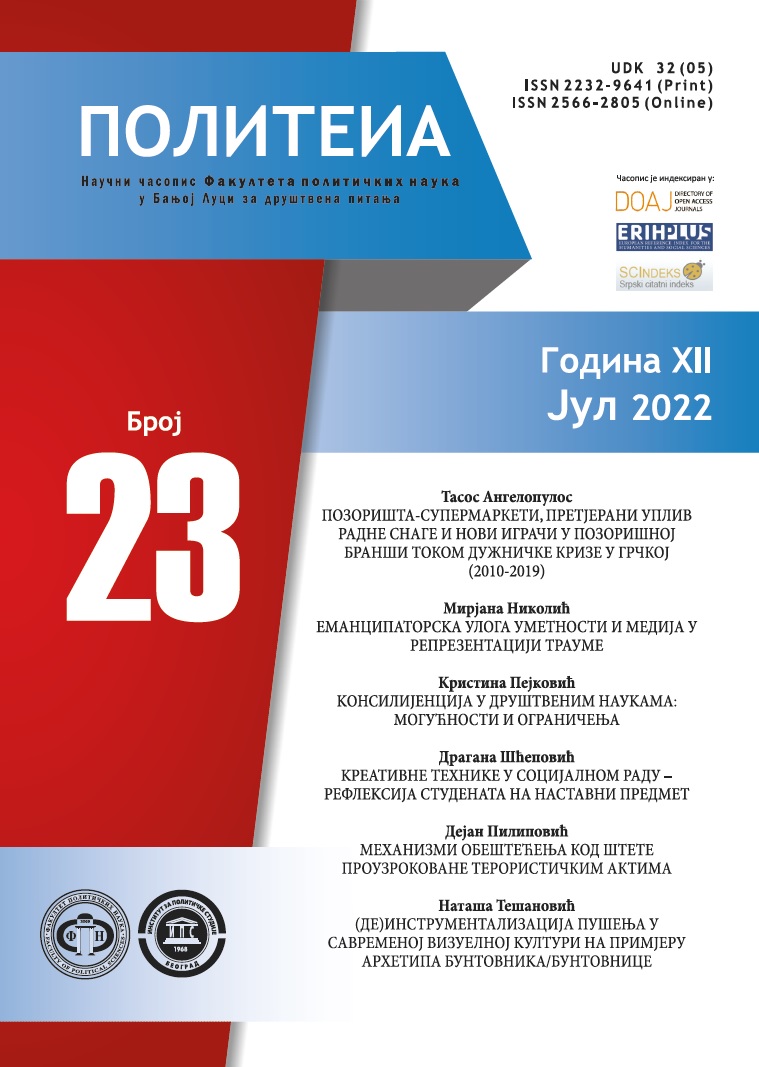CREATIVE TECHNIQUES IN SOCIAL WORK – STUDENTS' REFLECTION ON THE ACADEMIC COURSE
Abstract
Creative techniques as procedures for stimulating creativity and expression, which allow one to become aware of feelings, thoughts, and other contents from their own experience with the help of the media have recently found adequate application and produced solid results in social work. The academic course unit of Creative Techniques in Social Work, which is taught at the Study Programme of Social Work at the Faculty of Political Sciences in Banja Luka, is designed so that students, in addition to theoretical content, acquire skills and initial experiences in their practical application. The paper presents the results obtained by applying the focus group method, which featured the students of the Study Programme of Social Work. The content of the focus group activities is the students' reflection on the following: the content of the course unit, the teaching method, the involvement of students in the implementation of tasks, and the possibility of using creative techniques in social work. The analysis of the content of the focus group work shows that the students perceive this teaching method as innovative, since it requires their active approach to work and participation, and it allows elaboration of topics considered important for their profession, which opens new perspectives in social work with clients. According to the students, this course unit enables them to gain their own experience of using certain techniques and the media, gives them an opportunity to express themselves creatively, to develop critical thinking, as well as to become more sensitive towards problems of social work.
References
Bognar, L. i Kragulj, S. (2010). Kvaliteta nastave na fakultetu. Život i škola, 24: 169‒182.
Bognar, L. (2012). Kreativnost u nastavi. Napredak, 153 (1): 9‒20.
Chetnik, M (2008). Tehnike u dječijoj terapiji. Zagreb: Psihodinamske strategije.
Čudina Obradović, M. (1991). Nadarenost: razumijevanje, prepoznavanje, razvijanje. Zagreb: Školska knjiga.
Džokić, Z. (2010). Moć psihodrame – uvod u teoriju i praksu psihodrame. Novi Sad: Psihopolis.
IFSW (2014). Global Definition of Social Work. Posjećeno: 15. 3. 2017. URL: http://ifsw.org/get-involved/global-definition-of-social-work/IFSW
Klaić, B. (1990). Rječnik stranih riječi. Zagreb: Nakladni zavod Matice hrvatske.
Lepir, Lj., Dejanović, A. i Ristić, S. (2021). Izvještaj o sprovedenoj studentskoj evaluaciji studijskog programa socijalni rad Fakulteta političkih nauka u Banjoj Luci.
Liebmann, M. (2004). Art therapy for groups. New York: Brunner-Routledge.
Potkonjak, N. i dr. (1996). Pedagoški leksikon. Beograd: Zavod za udžbenike i nastavna sredstava.
Pregrad, J. (1996). Ekspresivne i kreativne tehnike. U J. Pregrad (ur.), Stres, trauma, oporavak. (str. 111‒135). Zagreb: Društvo za psihološku pomoć.
Pregrad J. (2004). Primjena metafora, kreativnih i ekspresivnih tehnika u superviziji. U M. Ajduković. i Lj. Cajvert (ur.), Supervizija u psihosocijalnom radu. (str. 209‒252). Zagreb: Društvo za psihološku pomoć.
Skoko, B. i Benović, V. (2009). Znanstvena metoda fokus grupa ‒ mogućnosti i načini primjene. Politička misao, (3): 217‒236.
Škrbina, D. (2013). ART terapija i kreativnost: multidimenzionalni pristup u odgoju, obrazovanju, dijagnostici i terapiji. Zagreb: Veble commerce.
Trebješanin, Ž. (2008). Rečnik psihologije. Beograd: Stubovi kulture.
Vranjković, Lj. (2010). Daroviti učenici. Život i škola, 24 (56): 253‒258.
Winnicott, W. D.(2004). Igra i stvarnost. Zagreb: Prosvjeta.
Autori koji objavljuju u ovom časopisu pristaju na sljedeće uslove:
- Autori zadržavaju autorska prava i pružaju časopisu pravo prvog objavljivanja rada i licenciraju ga "Creative Commons Attribution licencom" koja omogućava drugima da dijele rad, uz uslov navođenja autorstva i izvornog objavljivanja u ovom časopisu.
- Autori mogu izraditi zasebne, ugovorne aranžmane za neekskluzivnu distribuciju članka objavljenog u časopisu (npr. postavljanje u institucionalni repozitorijum ili objavljivanje u knjizi), uz navođenje da je članak izvorno objavljen u ovom časopisu.
- Autorima je dozvoljeno i podstiču se da postave objavljeni članak onlajn (npr. u institucionalni repozitorijum ili na svoju internet stranicu) prije ili tokom postupka prijave rukopisa, s obzirom da takav postupak može voditi produktivnoj razmjeni ideja i ranijoj i većoj citiranosti objavljenog članka (Vidi Efekti otvorenog pristupa).

